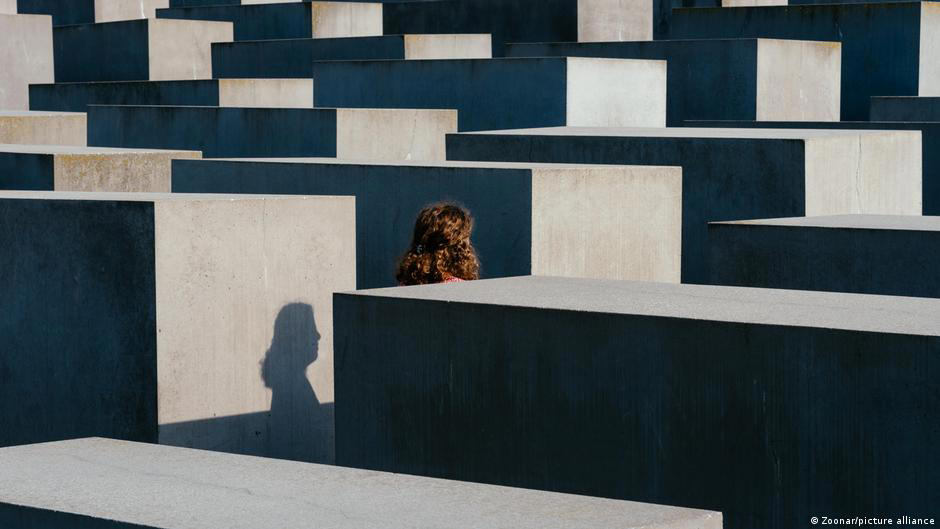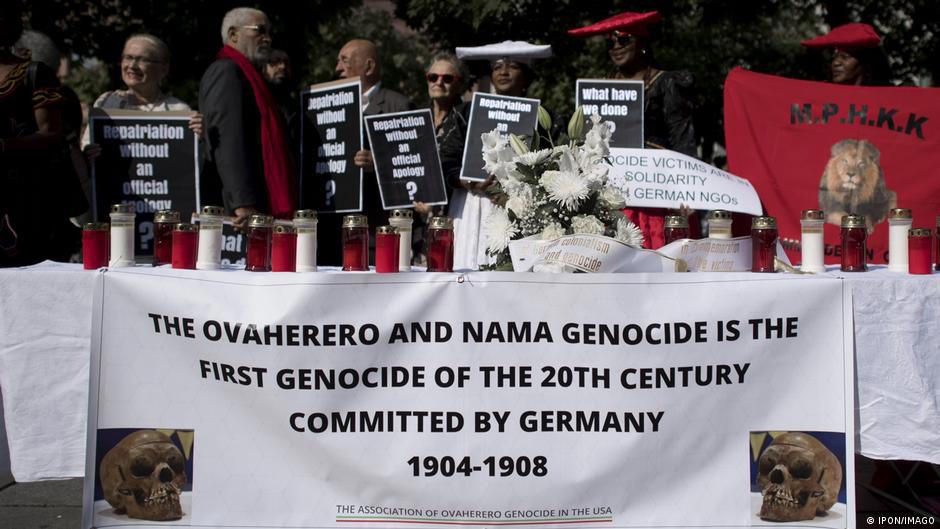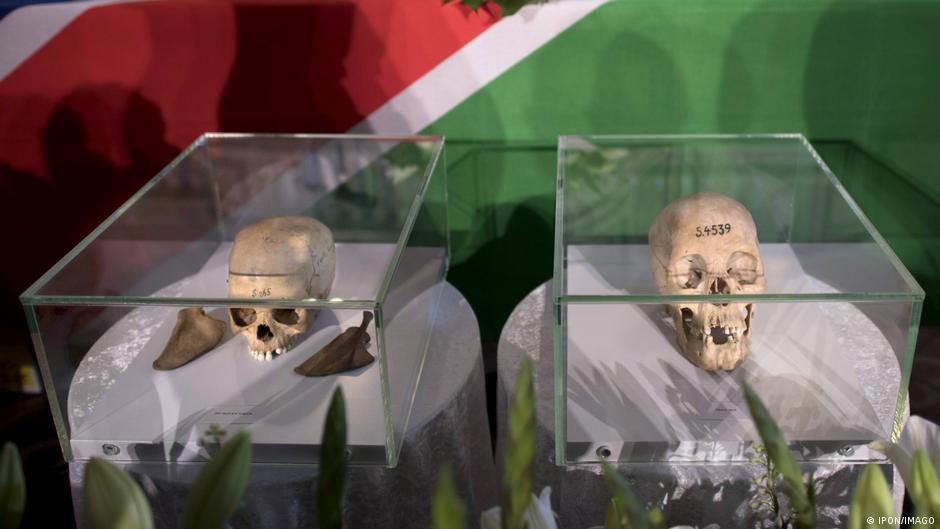Germany: Controversy over 'culture of remembrance' reform
The coalition government wants to expand its remembrance culture to include the history of German colonialism. Initial proposals have been met with criticism, in particular from heads of Holocaust memorial sites.

The Memorial to the Murdered Jews of Europe was inaugurated in 2005 and occupies an area of land close to the Bundestag right in the center of Berlin
For decades, many have considered Germany's "culture of remembrance" ("Erinnerungskultur") to be the gold standard for how a nation should deal with its dark past and commemorate the victims of tyranny.
However, pressure has been growing to integrate Germany's colonial past into its much-venerated remembrance culture. When Olaf Scholz's center-left government came to power in 2021, the coalition agreement stated that the country's culture of remembrance would be reformed to include colonial history and the histories of people who have migrated to Germany.
In February, the office of Federal Commissioner for Culture, Claudia Roth, published a 43-page list of reform proposals. But the ideas, which outlined five areas for reform — the history of National Socialism, the German Democratic Republic (GDR), the colonial past, democracy, and immigration — were quickly met with fierce criticism, in particular from the heads of Holocaust memorial sites.
Representatives from those institutions signed a letter saying that the new framework would introduce a "paradigm shift that would lead to a fundamental weakening of the culture of remembrance" and that it departed from "the long-standing consensus that National Socialist crimes must not be relativized."
For the signatories of the letter, Roth's proposals failed to make clear the central importance of the Holocaust to Germany and thus "can be understood as historically revisionist in the sense of trivializing Nazi crimes." Such was the strength of the criticism, that Roth's office subsequently removed the draft from its website.
Representatives from Holocaust memorial sites across Germany have since been invited to discuss their concerns with Roth before concrete proposals for the reforms are published in fall and do not wish to comment further until those talks have taken place.
Not a 'victimhood competition'
Tahir Della is the spokesperson for the Initiative of Black People in Germany (ISD), a non-profit organization representing the interests of Black people in Germany, which was invited by the Federal Office of the Commissioner for Culture to give feedback on the initial proposals.
Della welcomed the inclusion of colonial history into the broader culture of remembrance, but is keen to stress that this was not a "victimhood competition." He says that the IDS wants to be part of an exchange among Holocaust memorial sites, those for the Sinti and Roma, and the GDR system, "to make clear that historical experiences, histories and epochs of persecution must and should be seen as interwoven histories."
"Our point is that we are talking about colonial continuity that goes beyond the colonial period into the Nazi era, for example, that there were precursors, so to speak, before Germany was even officially a colonial power, that Germany was involved in colonial crimes, in enslavement," he told DW.

Descendents and civil society groups have long demanded official recognition of the crimes committed by German colonial forces in Africa
Della sees the current challenges of climate change, migration and displacement, and continuing trade inequalities, racism and anti-Black racism, as direct consequences of the European colonial era and that understanding colonial history is essential to dealing with these challenges — however difficult it may be to confront that history.
"I fear that [the reaction] is partly related to the fact that it means we have to 'revisit' a history that is not particularly positive for the writing of German history, for Germany's self-image, that so many people find it difficult to take these aspects of German history into account," he said.
Remembrance culture in a globalized world
Like Della, Sebastian Conrad, a professor of global and postcolonial history at Berlin's Free University, does not share the view that the proposed reforms, in particular the inclusion of Germany's colonial history, could lead to a trivialization of Nazi crimes.
"I don't share the premises of the criticism, that as soon as we are commemorating something else we are relativizing," he told DW.
For Conrad, the debate over remembrance culture reflects broader societal issues, in particular the issue of migration to Germany since 2015, which he says is often discussed on the level of memory politics. But as society changes, Conrad holds, the memory of the past is bound to be transformed as well.
""Every year, Germany changes — new Germans are born, new Germans come to the country. It would just not be realistic to think of memory as something stable and fixed, something frozen in time, something agreed upon and that's the way it remains," he said.
"The globalizing world in which we live has a longer history and this history is one where colonialism played a crucial role," he added. "So, whenever we want to understand how we got to our globalized present, we need to understand the history of imperialism, of empires, of colonialism as well."
Coming to terms with a past that is still present
Henning Melber, a German-Namibian political scientist, anti-colonial activist and author of a forthcoming book about the legacy of Germany's colonial rule, describes the response to Roth's proposals as "sad and regrettable."
"It almost seems to be a knee-jerk response, to be afraid that adding two more pillars to the commemoration of the Holocaust and the GDR — which, interestingly enough, was never considered to be a competition — would take away attention but possibly also funding for their activities," he told DW.

Germany handed back the human remains of indigenous people killed during its genocide in Namibia in 2018, but many more have yet to be returned
The Holocaust is often described, especially in contemporary Germany, as a "break in civilization" ("Zivilisationsbruch"), but postcolonial criticism argues that European colonial powers had already established a racist and violent rule, including genocide, in the name of civilization, before the Holocaust happened. Germany's own violent colonial history includes the genocide of the Herero and Nama (1904-08) in present-day Namibia.
"All those who demand adequate engagement with colonial crimes have never questioned that the Holocaust culminated in a singular form of planned, systematic, industrial mass extermination of a specific group, or rather one should add, of specific groups in the plural," Melber said.
"If I try to understand the perspective of the Herero and the Nama, the extermination strategy that killed most of their ancestors was a singular experience, so their victimhood is also one of singularity," he added. "It does not mean that they are the same. Nobody would say that. The demand is to give adequate recognition to the victims of these crimes and to demand sufficient atonement."
While Germany has often been praised for its remembrance culture around the Holocaust, Melber says it has "utterly failed" when it comes to the violent history of the German empire in the colonies, in part because former colonial powers are still beneficiaries of a (white supremacist) system based on exploitation, subjugation and oppression.
"Being willing to acknowledge history with the consequences that it had for us as beneficiaries and those who were on the receiving end creates a massive moral problem," he said. "How can we truly come to terms with that past in the present, because it's not past, it's present. Basically it means: How much are we willing to give up?"
Edited by Ben Knight and Kyra Levine
While you're here: Every Tuesday, DW editors round up what is happening in German politics and society. You can sign up here for the weekly email newsletter Berlin Briefing.
Author: Helen Whittle
